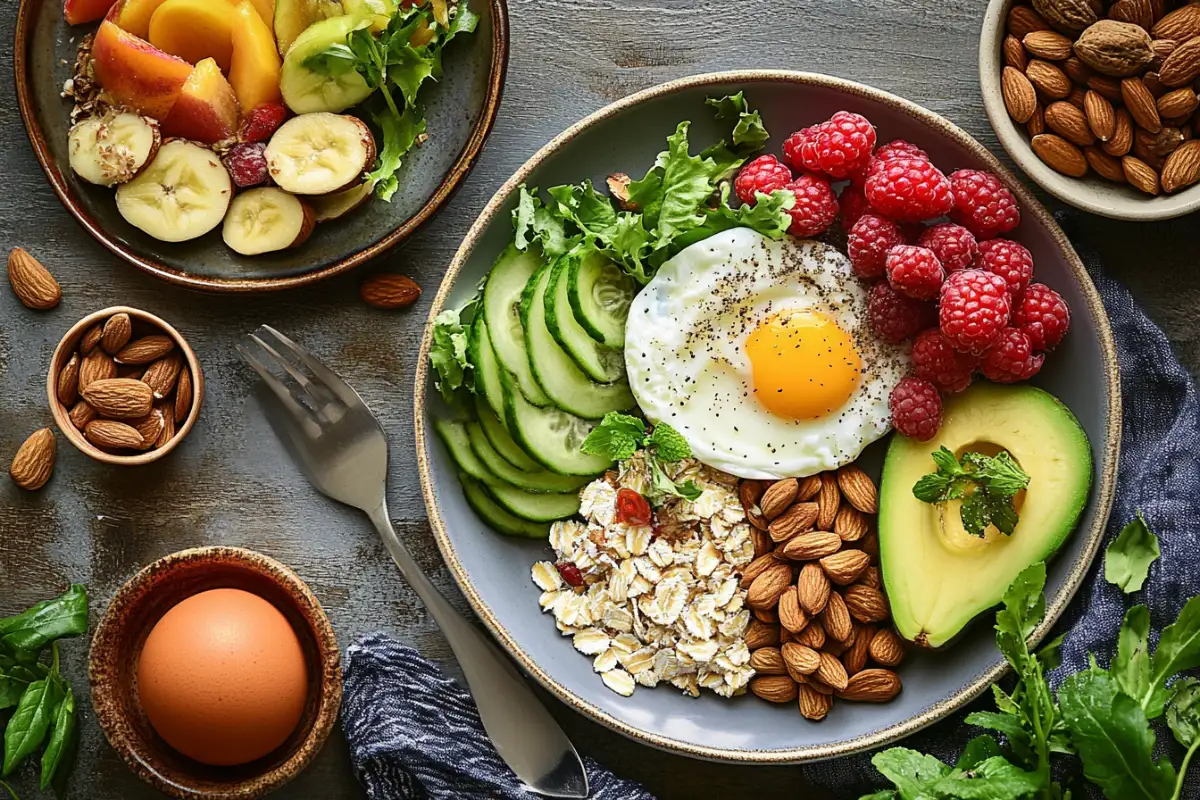Finding a good high-protein breakfast can set the tone for a day full of energy, focus, and satisfaction. High-protein meals in the morning not only boost metabolism but also help you feel full longer, reducing the chances of unhealthy snacking. But what exactly is a good high-protein breakfast? In this comprehensive guide, we’ll explore the benefits of a protein-packed morning meal, discuss a variety of high-protein breakfast options, and explain why it’s essential for a well-balanced diet.
Why a High-Protein Breakfast Is Important
Before delving into specific examples, it’s crucial to understand why a high-protein breakfast is beneficial. Breakfast is often called the most important meal of the day, and including a significant amount of protein can make all the difference. Protein is vital because:
- Increases Satiety: A high-protein breakfast keeps you full for longer. Protein takes more time to digest compared to carbs, which helps maintain satiety.
- Boosts Metabolism: Eating protein in the morning can help boost metabolism through a process called thermogenesis, where your body burns more calories to digest and metabolize protein.
- Supports Muscle Mass: Protein is crucial for muscle health. Having it in the morning helps repair and build muscles after physical activity or during natural turnover.
Benefits of Eating a High-Protein Breakfast
Including a good high-protein breakfast in your routine has a plethora of benefits, especially if your aim is to achieve a healthier lifestyle. Some of these benefits include:
- Reduced Appetite Throughout the Day: Protein affects hunger hormones such as ghrelin, which helps control appetite.
- Improved Blood Sugar Levels: High-protein breakfasts can lead to improved blood sugar and insulin responses compared to high-carb breakfasts.
- Weight Loss and Management: A protein-rich breakfast can help regulate calorie intake by reducing cravings, making it easier to maintain a caloric deficit.
- Increased Energy Levels: High-protein breakfasts, when paired with balanced carbs, provide sustainable energy without sugar crashes.
What Is a Good High-Protein Breakfast?
When we talk about what is a good high-protein breakfast, it is important to keep both nutrition and convenience in mind. Below are some fantastic options that can suit a variety of dietary preferences and time constraints.
1. Classic Eggs and Toast
Eggs are the quintessential high-protein breakfast option. They’re versatile, quick to prepare, and pack around 6 grams of protein per egg.
- Scrambled Eggs on Whole Grain Toast: Add vegetables such as spinach, tomatoes, or bell peppers for an extra nutritional boost.
- Avocado Egg Toast: Spread mashed avocado on whole grain toast and top with a poached egg.
- Omelette: Make an omelette with your favorite vegetables, a bit of cheese, and perhaps some lean ham.
2. Greek Yogurt Parfait
Greek yogurt is a fantastic source of protein, with around 10 grams per serving.
- Greek Yogurt with Berries and Nuts: Add some fresh berries and almonds or walnuts to boost the protein and fiber content.
- Chia Seeds and Greek Yogurt: Add a tablespoon of chia seeds for an extra 3 grams of protein, along with fiber and omega-3s.
3. Protein Smoothies
Smoothies are a great way to pack protein into a portable meal. By using a quality protein powder, you can easily increase the protein content.
- Berry Banana Protein Smoothie: Use a scoop of whey or plant-based protein powder, a banana, and a handful of mixed berries.
- Green Protein Smoothie: Blend together spinach, avocado, almond milk, and protein powder for a nutrient-dense drink.
4. Cottage Cheese Combinations
Cottage cheese is another excellent choice for a good high-protein breakfast.
- Cottage Cheese and Fruit: Combine cottage cheese with pineapple chunks, peaches, or berries for a refreshing breakfast.
- Cottage Cheese and Veggies: For a savory twist, add cucumber, tomatoes, and black pepper to your cottage cheese.
5. High-Protein Pancakes
Protein pancakes are a delicious way to boost your morning protein intake.
- Banana Protein Pancakes: Blend oats, a banana, an egg, and protein powder. Cook like traditional pancakes.
- Greek Yogurt Pancakes: Replace some of the flour with Greek yogurt to increase the protein content.
6. Quinoa Breakfast Bowl
Quinoa is not just for lunch or dinner—it’s also great for breakfast! With about 8 grams of protein per cup, quinoa is a good alternative for those who are gluten-free.
- Quinoa Porridge: Cook quinoa in almond milk and top it with nuts and fruit.
- Savory Quinoa Bowl: Mix quinoa with scrambled eggs, spinach, and avocado for a savory morning option.
7. Overnight Oats with Protein Boosters
Overnight oats are a great option if you’re short on time in the morning.
- Overnight Oats with Protein Powder: Add a scoop of protein powder to your oats for a simple protein boost.
- Peanut Butter and Banana Overnight Oats: Combine oats, almond milk, peanut butter, and banana for a rich and creamy breakfast with plenty of protein.
More High-Protein Breakfast Ideas for Different Dietary Needs
1. Vegan High-Protein Breakfast Options
For those following a vegan diet, finding a good high-protein breakfast can be slightly more challenging but certainly not impossible. Here are some protein-packed vegan options:
- Tofu Scramble: Tofu makes an excellent egg substitute. Scramble tofu with turmeric, black salt, and vegetables for a protein-rich vegan breakfast.
- Chickpea Pancakes: Made with chickpea flour, these savory pancakes are high in protein and can be topped with vegetables or vegan yogurt.
- Vegan Protein Smoothie: Use a plant-based protein powder and combine it with almond milk, spinach, bananas, and nut butter.
- Chia Pudding: Mix chia seeds with almond milk and leave overnight to create a pudding. Top with berries and nuts for a complete meal.
2. Gluten-Free High-Protein Breakfast Ideas
If you’re gluten-free, you still have plenty of options when it comes to a good high-protein breakfast.
- Egg Muffins: Bake eggs in a muffin tin with vegetables and cheese for easy, portable breakfast options that are naturally gluten-free.
- Quinoa and Black Bean Bowl: Quinoa combined with black beans, avocado, and salsa can make a hearty breakfast bowl full of protein.
- Smoothie Bowl: Blend Greek yogurt (or a non-dairy alternative) with frozen fruit and protein powder. Top with gluten-free granola and seeds.
3. High-Protein Breakfast for Keto Diet
For those on a ketogenic diet, it is crucial to keep carbs low while focusing on protein and fat.
- Bacon and Eggs: A classic keto breakfast that provides both high protein and high fat. Add some leafy greens to balance it out.
- Avocado Egg Cups: Bake eggs in avocado halves for a combination of protein and healthy fats.
- Cheese Omelette: Add extra cheese and a few low-carb vegetables to an omelette to increase protein and fat content.
- Keto Protein Shake: Mix a low-carb protein powder with unsweetened almond milk and a bit of heavy cream for a rich, satisfying shake.
Incorporating High-Protein Breakfasts Into Your Routine
The Science Behind Protein Timing
The timing of protein intake can have significant effects on how the body utilizes it. Eating protein in the morning has been shown to:
- Promote Muscle Synthesis: After a night of fasting, the body needs amino acids to kickstart muscle protein synthesis. A high-protein breakfast can provide these essential nutrients to help repair and build muscle.
- Improve Mental Focus: Protein also plays a role in neurotransmitter production, contributing to mental alertness and focus throughout the day.
How Much Protein Do You Need at Breakfast?
The ideal amount of protein can vary depending on age, weight, and activity level. However, most nutritionists recommend aiming for 15 to 30 grams of protein at breakfast. This range helps support satiety, metabolism, and muscle health.
Tips to Increase Protein Intake at Breakfast
- Add Protein to Your Coffee: Protein coffee, also known as “proffee,” is a popular trend where protein powder or ready-made protein drinks are added to coffee.
- Swap Ingredients: Use higher-protein versions of common ingredients. For example, replace regular yogurt with Greek yogurt or switch standard oats for protein-fortified oats.
- Include Nuts and Seeds: Sprinkle chia seeds, flaxseeds, or almonds on top of cereal, oats, or smoothies to boost protein.
- Use Nut Butters: Nut butters like almond or peanut butter are an excellent addition to toast, smoothies, or pancakes to up the protein content.
Meal Prep Ideas for High-Protein Breakfasts
Meal prepping can be a game-changer when trying to incorporate more protein into your breakfast:
- Egg Muffins: Prepare these at the beginning of the week and keep them refrigerated for a quick breakfast on the go.
- Overnight Oats: Mix oats, milk, protein powder, and desired toppings in jars for a grab-and-go breakfast.
- Breakfast Burritos: Make burritos with scrambled eggs, beans, and cheese. Wrap them in foil and freeze for easy reheating.
- Chia Pudding: Make a large batch of chia pudding and portion it into servings, adding different toppings each day for variety.
Common Myths About High-Protein Breakfasts
Myth 1: High-Protein Breakfasts Are Only for Bodybuilders
This is a common misconception. While bodybuilders do require high-protein diets for muscle building, everyone can benefit from increased protein in the morning. It helps with satiety, energy, and weight management for all kinds of people.
Myth 2: Too Much Protein Can Be Harmful
There is a persistent belief that a high-protein diet may damage the kidneys. However, for healthy individuals, there is no evidence to support this. In fact, protein is essential for various bodily functions, and consuming more at breakfast can be highly beneficial.
Myth 3: Carbs Are Better for Breakfast Than Protein
Carbohydrates are an important energy source, but starting the day with only carbs can lead to quick spikes and drops in blood sugar levels, resulting in energy crashes. Including protein helps stabilize blood sugar and provides a steady stream of energy.
High-Protein Breakfast Recipes to Try
Egg White and Spinach Omelette
- Ingredients:
- 4 egg whites
- 1 cup spinach
- 1/4 cup diced tomatoes
- Salt and pepper to taste
- Instructions:
- Heat a non-stick skillet over medium heat.
- Add the egg whites and cook until they begin to set.
- Add spinach and tomatoes.
- Cook until the spinach wilts and the egg whites are fully set.
- Season with salt and pepper.
Peanut Butter Protein Overnight Oats
- Ingredients:
- 1/2 cup rolled oats
- 1 cup almond milk
- 1 scoop vanilla protein powder
- 1 tablespoon peanut butter
- 1/2 banana, sliced
- Instructions:
- In a jar, combine oats, almond milk, protein powder, and peanut butter.
- Stir until well combined.
- Refrigerate overnight.
- Top with banana slices before serving.
Greek Yogurt Berry Bowl
- Ingredients:
- 1 cup Greek yogurt
- 1/2 cup mixed berries
- 1 tablespoon chia seeds
- 1 tablespoon honey
- Instructions:
- In a bowl, add Greek yogurt.
- Top with mixed berries and chia seeds.
- Drizzle with honey before serving.
Savory Quinoa and Egg Bowl
- Ingredients:
- 1 cup cooked quinoa
- 2 eggs
- 1/2 avocado
- Salt and pepper to taste
- Instructions:
- Cook the eggs to your preference (poached or scrambled).
- In a bowl, add quinoa and top with eggs and sliced avocado.
- Season with salt and pepper.
Frequently Asked Questions
What is the best protein for breakfast?
Eggs, Greek yogurt, and protein powder are among the best protein sources for breakfast.
How can I get 30g of protein for breakfast?
Combine eggs with Greek yogurt or a protein smoothie to easily reach 30g of protein.
Is 2 eggs a high-protein breakfast?
Two eggs provide about 12 grams of protein, making it a moderate but healthy high-protein breakfast.
What is the best high-protein breakfast for weight loss?
Egg white scrambles, protein smoothies, and cottage cheese with berries are excellent high-protein breakfasts for weight loss because they help maintain satiety, provide essential nutrients, and support overall energy balance throughout the day.

